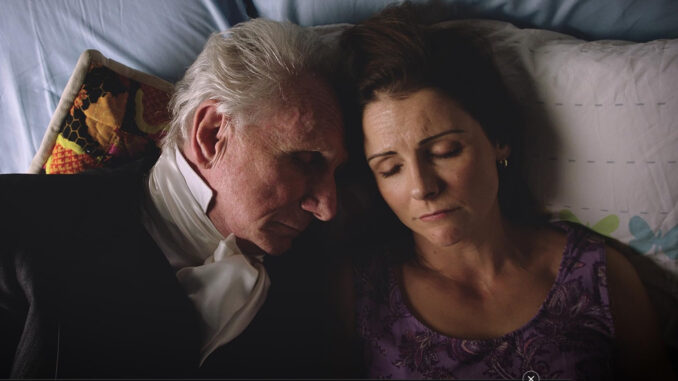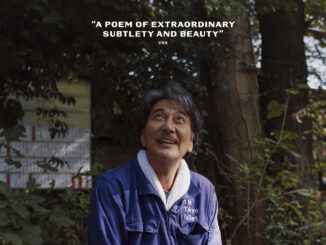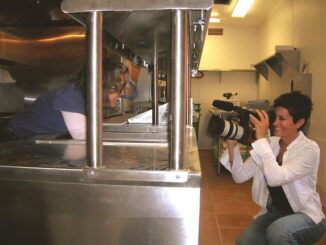
A few years ago, I received a phone call from Amanda Melby requesting my help to produce her feature film project. My immediate reaction was one of apprehension and dread. On the one hand, Amanda and I shared a mutual desire to showcase the creativity and versatility of the local indie film community. On the other hand, I knew from experience that producing an independent feature film was a thankless and frustrating pursuit that often left the producers exhausted and penniless.
What neither of us knew at the time was that this project would have us rubbing elbows with the likes of veteran actors, Richard Dreyfuss (“Jaws”, “The Goodbye Girl”), M. Emmet Walsh (“Blade Runner”, “Blood Simple”), and Rene Auberjonois (“M*A*S*H”, “Star Trek: Deep Space Nine”). In addition, my name would be inextricably linked to a certain “troubled” actor for as long as there exists an Internet.

Almost from the moment we met, nearly 20 years ago, Amanda and I were collaborating on a new and innovative TV show called “Screen Wars”. Amanda was a writer/producer and on-screen talent. I was behind the scenes writing and directing. Each week, we would build a show around a specific theme, inviting local screenwriters to submit their short film scripts to the show. A cadre of semi-professional filmmakers, myself and Amanda included, would select the best scripts to shoot for each week’s episode.
We showcased some of the most talented filmmakers in the Valley, including writer/director Bruce Dellis, a longtime friend and collaborator. Under Amanda’s guidance, Screen Wars enjoyed a three-year stint on Arizona local television and was nominated for three Rocky Mountain Emmy Awards. If that weren’t enough, at the same time, Amanda was building a boutique acting school, Verve Studios, in the heart of affluent Scottsdale, AZ. Verve currently celebrates its 18th year in the business of grooming film and media talent.

So when Executive Producer Amanda Melby rings you up and says, in not so many words, “I need your help”, how could one not rise to the occasion? And so I did. The result was a feature-length dark comedy titled “Raising Buchanan”, where I served as the producer and Amanda was both the executive producer and lead actor, alongside the much beloved Rene Auberjonois in the title role. (Sadly, Rene passed away in 2019, accepting our project, even as he struggled with cancer, as his end-of-life swan song.)
As President James Buchanan, arguably one of the three worst presidents ever, Rene turns in a sympathetic performance as the apparition of a man wrestling with his tainted legacy. Amanda (as ne’er-do-well, Ruth Kiesling) holds her own, verbally sparring with this Shakespearean-trained performer, while her character, Ruth, grapples with her own abhorrent reputation as a liar and a thief. The result is a bittersweet journey of redemption for both Ruth and Buchanan.

In the making of a movie — even a low-budget indie — the preproduction phase is often the most challenging. The casting process alone can push out a movie’s schedule by weeks or even months. This, in turn, can wreak havoc on the scheduling of other cast members, crew, locations, permits, and ultimately, investor returns. Factor in weather conditions, and a film production can seem like it’s taking forever to get off the ground. These all weigh heavily on the producers. It was to our advantage that Amanda was the exec at the helm of this project. Lucky for everyone else that she and I (and Bruce Dellis!) had a good working relationship and were able to surmount pretty much any obstacle in our way.

Things happened. A popular actor signed on, nabbed a better part elsewhere, and simply disappeared. Industry “professionals” openly discussed talent salaries, leading said talent to complain about pay parity even among different roles. And then there was the troubled comedic performer who, it was promised, had been sober for several months, only to arrive on set a day late, quite drunk, and shoeless. He was subsequently fired for inappropriate advances toward several crew members. Robert Ben Garant stepped in to take over that role, for which we owe a debt of gratitude to his wife, Cathy Shim (who plays Ruth’s co-conspirator, Meg), for convincing Garant to jump in at the last minute.
To say that Amanda remained unflappable through all of this would be an understatement. Perhaps it helped that the two most laid-back people in the world, Bruce Dellis (who directed), and myself, were always there to make lemonade out of so many lemons, while Amanda and company plied their trade in front of the camera. We all become better when we work with people who are of like minds, compatible temperaments, and common goals.

So what fuels this drive to succeed and advance in an industry that is both fickle and unpredictable? What are the challenges of working with acting hopefuls who constantly feel the pull of nearby Hollywood? Is there a long term strategy that’s intended to propel Amanda Melby and Verve Studios – a business she built from the ground up in a less than hospitable environment — into the mainstream? No doubt Amanda Melby will rise to the constant challenges of her profession, making level-headed decisions, taking bold and innovative steps, breaking new ground, and doing it all with style and grace.




Be the first to comment